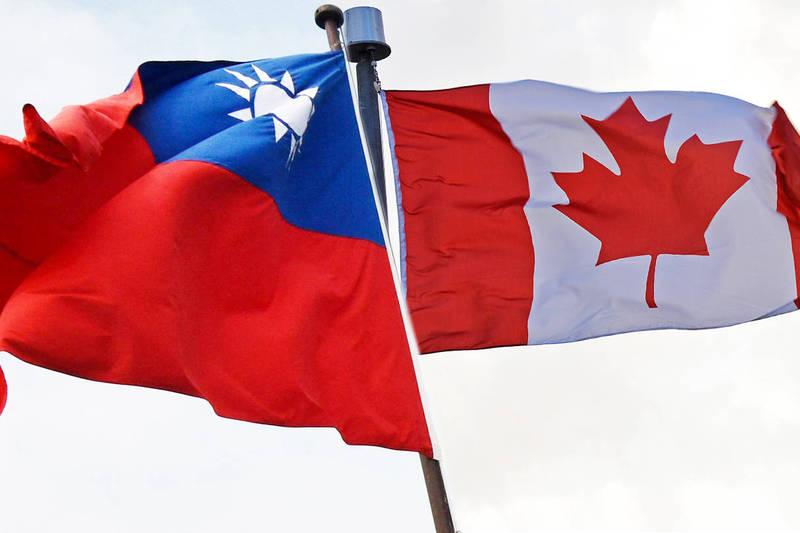The Canadian government has posted a team of cybersecurity experts at its Taipei office, Canadian media reported yesterday, as Ottawa deepens cooperation with Taiwan to combat hacking and disinformation from China.
Recognizing China poses the biggest threat to both Canada and Taiwan in terms of cybersecurity, Ottawa wants to work with Taiwan to respond to that threat, the Globe and Mail reported.

Photo: AFP
Canada’s Communications Security Establishment in a report last week identified China as “the most comprehensive cybersecurity threat facing Canada today."
As Canada does not have formal relations with Taiwan, it has been cautious about cooperating with Taipei regarding national security.
In January, Ottawa quietly sent officials to Taipei to study disinformation during Taiwan’s presidential election, much of which was conducted by China, the Globe and Mail reported.
Canada has also dispatched cybersecurity teams to Canberra, Seoul, Singapore and Tokyo as a part of its Indo-Pacific strategy, the Canadian Department of Global Affairs told the newspaper.
“Through the Indo-Pacific Strategy, Canada is committed to enhancing and diversifying its security partnerships and building its cyberdiplomacy, especially as concerns over foreign interference, state-sponsored disinformation, cybersecurity and cybercrime have become increasingly significant,” department spokesperson Charlotte MacLeod said.
Richard Fadden, a formal national security advisor to two of Canada’s prime ministers and previous head of the Canada Service Intelligence Service, led a group of former Canadian security and defense officials on a trip to Taiwan in September, marking the highest level of engagement between the two countries on national security to date, the paper said.
There is a growing consensus in Canada that if Beijing successfully annexes Taiwan, it would only embolden the Chinese government, so Ottawa plans to quietly deepen its cooperation with Taiwan, Fadden told the paper.
Canada is helping Taiwan improve its national security by providing military goods and technology, the Globe and Mail reported.
Last year, exports of military goods and technology to Taiwan rose to C$32.6 million (US$23.47 million), the highest on record, the paper said, citing department data.
Taiwan also plays an important role in Canada’s growing lithium-ion battery supply chain, it reported.
In November last year, the Canadian federal government and British Columbia provincial government supported E-One Moli Energy Corp, a Taiwanese company, to establish a lithium-ion manufacturing plant in Maple Ridge, aiming to make the area a center of the global supply chain for battery components, the report said.

Taiwan is stepping up plans to create self-sufficient supply chains for combat drones and increase foreign orders from the US to counter China’s numerical superiority, a defense official said on Saturday. Commenting on condition of anonymity, the official said the nation’s armed forces are in agreement with US Admiral Samuel Paparo’s assessment that Taiwan’s military must be prepared to turn the nation’s waters into a “hellscape” for the Chinese People’s Liberation Army (PLA). Paparo, the commander of the US Indo-Pacific Command, reiterated the concept during a Congressional hearing in Washington on Wednesday. He first coined the term in a security conference last

Prosecutors today declined to say who was questioned regarding alleged forgery on petitions to recall Democratic Progressive Party (DPP) legislators, after Chinese-language media earlier reported that members of the Chinese Nationalist Party (KMT) Youth League were brought in for questioning. The Ministry of Justice Investigation Bureau confirmed that two people had been questioned, but did not disclose any further information about the ongoing investigation. KMT Youth League members Lee Hsiao-liang (李孝亮) and Liu Szu-yin (劉思吟) — who are leading the effort to recall DPP caucus chief executive Rosalia Wu (吳思瑤) and Legislator Wu Pei-yi (吳沛憶) — both posted on Facebook saying: “I

The Ministry of Economic Affairs has fined Taobao NT$1.2 million (US$36,912) for advertisements that exceed its approved business scope, requiring the Chinese e-commerce platform to make corrections in the first half of this year or its license may be revoked. Lawmakers have called for stricter enforcement of Chinese e-commerce platforms and measures to prevent China from laundering its goods through Taiwan in response to US President Donald Trump’s heavy tariffs on China. The Legislative Yuan’s Finance Committee met today to discuss policies to prevent China from dumping goods in Taiwan, inviting government agencies to report. Democratic Progressive Party Legislator Kuo Kuo-wen (郭國文) said

The Ministry of Economic Affairs has fined Taobao NT$1.2 million (US$36,900) for advertisements that exceeded its approved business scope and ordered the Chinese e-commerce platform to make corrections in the first half of this year or its license would be revoked. Lawmakers have called for stricter supervision of Chinese e-commerce platforms and more stringent measures to prevent China from laundering its goods through Taiwan as US President Donald Trump’s administration cracks down on origin laundering. The legislature’s Finance Committee yesterday met to discuss policies to prevent China from dumping goods in Taiwan, inviting government agencies to report on the matter. Democratic Progressive Party